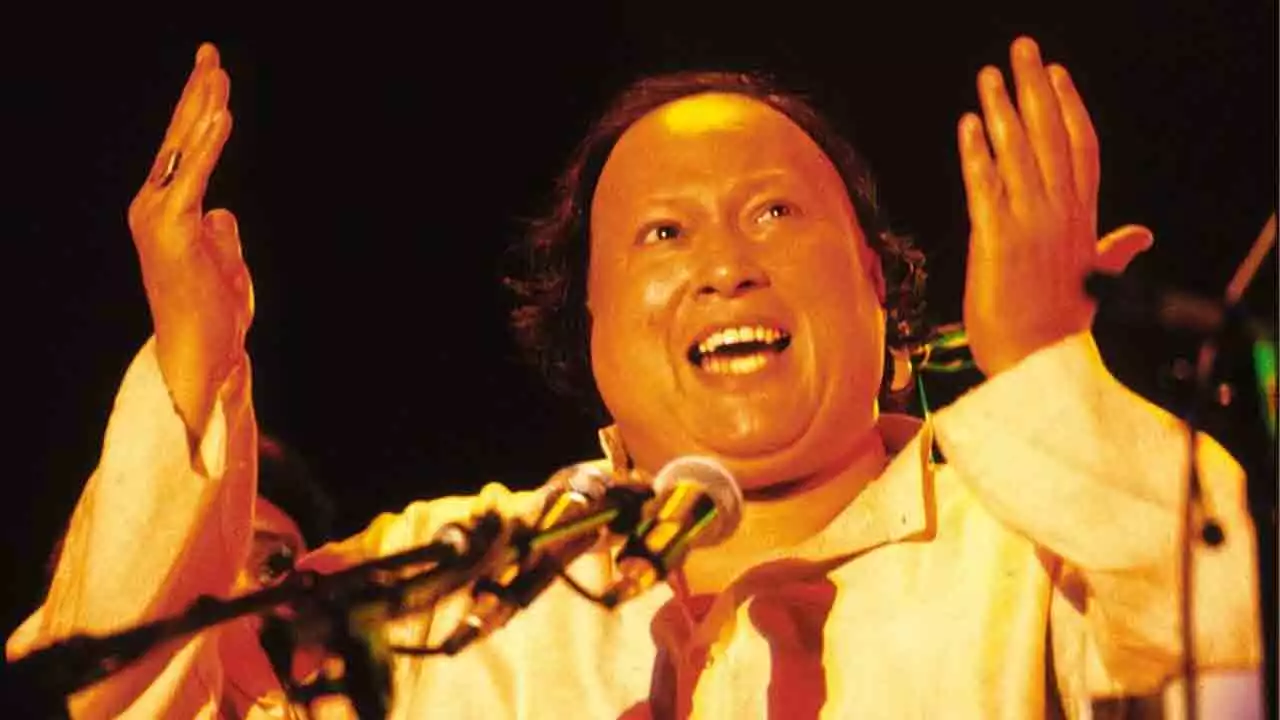Ustad Nusrat Fateh Ali Khan, a name that resonates across the globe, was not just a singer but an institution in the world of music. For more than four decades, he ruled the realm of Qawwali and ghazals, mesmerizing audiences with his powerful voice and profound lyrics. Even today, his fans fondly remember him, and his music continues to inspire generations of musicians and listeners alike.
Early Life and Musical Roots
Born on October 13, 1948, in the Darbar Lasuri Shah Jhang Bazar area of Faisalabad, Pakistan, Nusrat Fateh Ali Khan hailed from a family deeply rooted in the tradition of Qawwali. His family had been singing Qawwali for centuries, passing down the rich heritage from one generation to the next. Nusrat grew up immersed in this musical atmosphere, and it wasn’t long before his talent started to shine through.
As he matured, so did his understanding of music, particularly the art of Qawwali—a form of Sufi devotional music that blends poetry and rhythm to evoke spiritual ecstasy. Under the guidance of his father, Ustad Fateh Ali Khan, and uncles, Nusrat honed his skills, learning the nuances of classical singing and Qawwali. His training was rigorous, and he inherited the family tradition with great dedication, ready to take the art form to new heights.
The Rise of a Legend
Nusrat Fateh Ali Khan made his debut as a Qawwal in the 1970s, and it didn’t take long for him to gain recognition. His voice, with its remarkable range and control, set him apart from other singers. He could switch effortlessly between low and high notes, and his ability to convey deep emotion through his singing made his performances unforgettable.
He soon became known as the “Shahenshah-e-Qawwali” (King of Qawwali), a title that reflected his unparalleled mastery over the art form. His Qawwalis weren’t just performances; they were spiritual experiences that transported listeners to another realm. His unique style combined traditional Qawwali with modern elements, making it accessible to a wider audience, both in Pakistan and abroad.
Iconic Qawwalis and Ghazals
Throughout his career, Nusrat Fateh Ali Khan sang hundreds of Qawwalis and ghazals, many of which became legendary. His famous Qawwalis, such as Dum Mast Qalandar Mast Mast, Ali Maula Ali, and Mera Piya Ghar Aya, are still cherished by fans across the world. Each of these performances showcased his incredible vocal range and ability to connect with his audience on a deeply spiritual level.
One of his most popular Qawwalis, Dum Mast Qalandar Mast Mast, is a Sufi devotional piece that honors the famous Sufi saint, Lal Shahbaz Qalandar. Nusrat’s rendition of this Qawwali is known for its energy, passion, and soul-stirring rhythm. Similarly, Ali Maula Ali celebrates the reverence of Hazrat Ali, a central figure in Islamic history, and is a perfect example of Nusrat’s ability to combine devotion with musical excellence.
Other timeless pieces, such as Akhiyan Udeek Diyan, Kisi Da Yaar Na Vichhde, and Allah Hoo, continue to be sung by Qawwals today, with many aspiring singers paying tribute to Nusrat’s genius by performing his compositions. His music transcended cultural and geographical boundaries, gaining him fans from all walks of life, including those who didn’t understand the language but felt the emotion behind every note.
Influence on Modern Music
Ustad Nusrat Fateh Ali Khan’s influence extended beyond the world of Qawwali and classical music. His collaborations with international artists, such as Peter Gabriel and Michael Brook, brought his unique style to Western audiences. He contributed to the soundtracks of several Hollywood films, including Dead Man Walking and The Last Temptation of Christ, further solidifying his global presence.
Despite the fusion with Western music, Nusrat never strayed from his roots. He remained deeply connected to Sufi traditions, and his music was always a reflection of his spirituality. His ability to blend traditional Sufi poetry with contemporary musical elements made him a trailblazer, and many artists in Pakistan and around the world have been inspired by his work.
Legacy and Continued Relevance
Even after his passing on August 16, 1997, Ustad Nusrat Fateh Ali Khan’s legacy lives on. His music remains as popular today as it was during his lifetime, and his influence on Qawwali, ghazals, and Sufi music is immeasurable. He left behind a treasure trove of musical compositions that continue to inspire musicians, and his work is considered essential learning for anyone pursuing a career in Qawwali or classical music.
Qawwals and singers today often say that it is impossible to truly master Qawwali without singing Nusrat Fateh Ali Khan’s compositions. His impact on the genre is so profound that no Qawwal can be considered complete without learning and performing his iconic pieces. He set a standard for musical excellence that remains unmatched, and his work continues to shape the world of music.
Ustad Nusrat Fateh Ali Khan was more than just a singer; he was a cultural icon, a musical genius, and a spiritual ambassador. His powerful voice and emotional depth touched the hearts of millions, and his music transcended borders, languages, and cultures. Whether through his soulful Qawwalis or heart-touching ghazals, Nusrat’s legacy continues to resonate with listeners around the world, reminding us of the timeless beauty of his art. As long as his music is played, Nusrat Fateh Ali Khan’s spirit will live on, immortalized through the powerful notes and verses he left behind.



